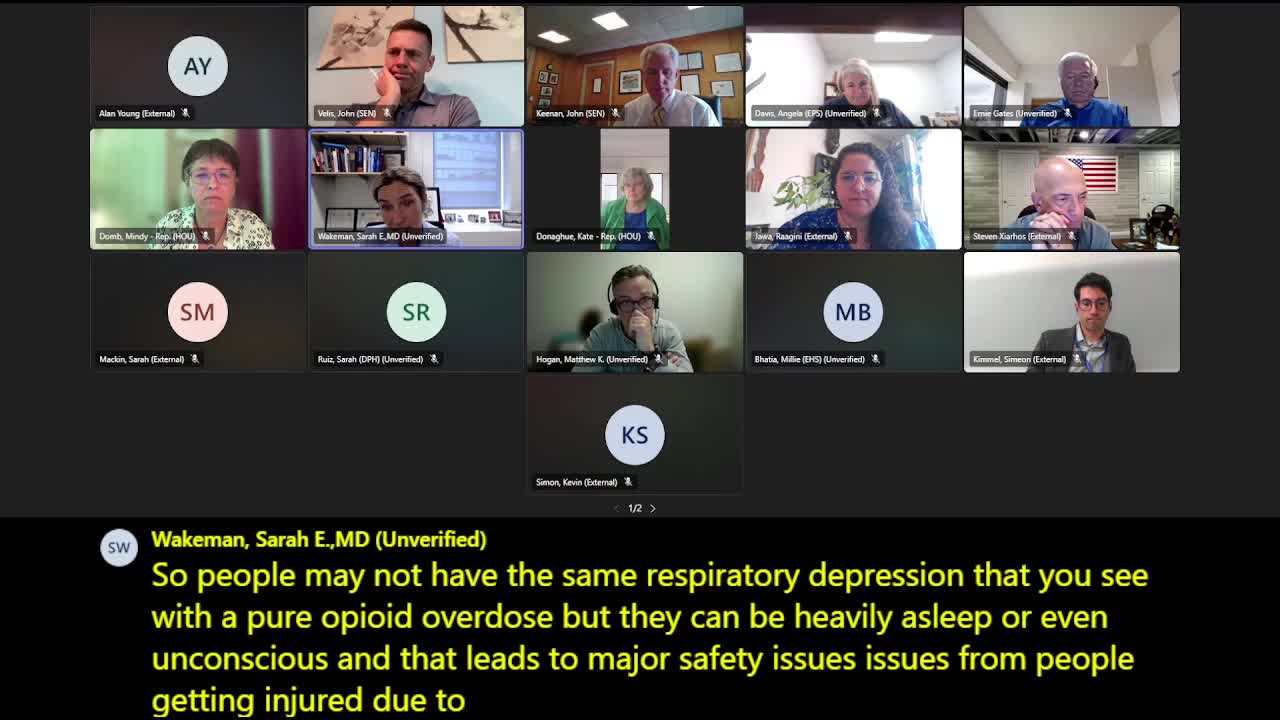Health experts discuss xylazine's severe skin wounds and withdrawal complications
June 23, 2025 | 2025 Legislature MA, Massachusetts
This article was created by AI summarizing key points discussed. AI makes mistakes, so for full details and context, please refer to the video of the full meeting. Please report any errors so we can fix them. Report an error »

The Massachusetts Legislature convened on June 23, 2025, to address the alarming public health effects of xylazine, a substance increasingly linked to severe health complications. The meeting highlighted the urgent need for improved medical responses and public awareness regarding the drug's dangerous impacts.
One of the most pressing issues discussed was the association of xylazine with necrotic skin wounds, characterized by black, dead tissue. These wounds can occur not only at injection sites but also in individuals who smoke or sniff substances containing xylazine. Experts believe that blood vessel constriction may be a contributing factor, although the exact mechanism remains under investigation. The wounds resemble burn injuries and require specialized care to prevent complications, including potential amputations if left untreated.
Additionally, the meeting underscored that xylazine exacerbates withdrawal symptoms for users, complicating their ability to seek necessary medical care. This increased suffering poses significant challenges for individuals in addiction treatment settings, making it harder for them to receive the help they need.
The discussions also touched on the importance of effective wound care and the role of healthcare professionals in managing these complex cases. Experts emphasized the need for ongoing research and innovative approaches to drug testing and monitoring to better understand and combat the effects of xylazine in the community.
As Massachusetts grapples with the rising prevalence of xylazine-related health issues, the legislature's commitment to addressing these challenges signals a proactive approach to safeguarding public health and supporting affected individuals. The implications of these discussions are critical, as they pave the way for enhanced healthcare strategies and community support systems aimed at mitigating the impact of this dangerous substance.
One of the most pressing issues discussed was the association of xylazine with necrotic skin wounds, characterized by black, dead tissue. These wounds can occur not only at injection sites but also in individuals who smoke or sniff substances containing xylazine. Experts believe that blood vessel constriction may be a contributing factor, although the exact mechanism remains under investigation. The wounds resemble burn injuries and require specialized care to prevent complications, including potential amputations if left untreated.
Additionally, the meeting underscored that xylazine exacerbates withdrawal symptoms for users, complicating their ability to seek necessary medical care. This increased suffering poses significant challenges for individuals in addiction treatment settings, making it harder for them to receive the help they need.
The discussions also touched on the importance of effective wound care and the role of healthcare professionals in managing these complex cases. Experts emphasized the need for ongoing research and innovative approaches to drug testing and monitoring to better understand and combat the effects of xylazine in the community.
As Massachusetts grapples with the rising prevalence of xylazine-related health issues, the legislature's commitment to addressing these challenges signals a proactive approach to safeguarding public health and supporting affected individuals. The implications of these discussions are critical, as they pave the way for enhanced healthcare strategies and community support systems aimed at mitigating the impact of this dangerous substance.
View full meeting
This article is based on a recent meeting—watch the full video and explore the complete transcript for deeper insights into the discussion.
View full meeting
